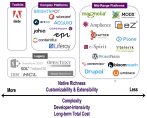The boondoggle that is software maintenance fees
Annual software support and maintenance fees are something every customer loves to hate, and yet, for the most part we keep paying them. Technology managers fear "going naked," right up until they replace the package. Meanwhile, the underlying economics keep vendors keen to promote what has become a major profit center for most.
And which vendor has perfected the maintenance fee profit engine? You guessed it: Oracle. InformationWeek's Bob Evans explains in an excellent column, "Global CIO: How 22% Annual Fees For You Equals 51% Operating Margins For Oracle."
I think Oracle's success has had a huge influence on the technology marketplace. In the ten years that I've been covering content management, portals, search, et. al., I've seen many other vendors deliberately mimic Oracle's model.
And we're not just talking about commercial vendors here. A new breed of "commercial open source" vendors has also explicitly copied Oracle's approach: if a lion's share of the profits lies in customers paying annual fees, why charge for the software up front at all? Simply invest a little R&D to get started, use consulting projects and whatever the community can muster to drive ongoing innovation, carefully collar tech support costs, grow the company, and then sell it to a larger firm looking to acquire reliable revenue streams...such as Oracle.
These fees would feel less galling if you received great support in return. You've told us over the years that some vendors do indeed excel here. But most do not.
Then there's the thorny issue of supporting the software versus supporting (and upgrading) the implementation. In most sizable projects, someone (either your developers, a consulting firm, or a vendor's professional services arm) has so heavily customized the software that your vendor's tech support can quickly become impotent, save for addressing common bugs or very low-level problems. We've been advising buyers to take a close look at warranties and tech support within any consulting contracts, including those signed with a vendor. Remain particularly alert when buying software via a re-seller -- an increasingly prevalent model in the Web CMS market, as well as several others we cover.
Is there anything to like about maintenance fees? Some observers pointed out on Twitter yesterday that we should at least value the predictability of such expenses, even as we decry the rates (@lehawes). Annual fees help provide a kind of insurance for the customer and enable the vendor to invest in long-term support for the core codebase. And they put less pressure on vendors to front-load their total costs+ profit (@damtrends). Presumably vendors can break-even now, then profit later.
But oh, the profits. As part of our evaluations of publicly-traded vendors, we often listen in on quarterly financial analyst calls, which as Evans notes, can be quite revealing. One of my favorite vendor boasts to equity markets is, "obtaining a higher yield from existing customers." How much should financial performance matter to you the buyer? A little. It's good to know your vendor won't go bankrupt. Nonetheless, I think traditional technology analyst firms do enterprise buyers an injustice by too often conflating a software vendor's financial success with technical acumen or product development skill. (Some analysts also mis-identify vendor marketing and sales acumen with customer value, but that's another story....) I'm quite certain that in the software world, there's no definite correlation between profits and quality. According to Oracle's CFO, there is a correlation between profits and size of maintenance base.
There's some good news, though. We're seeing increasingly better peer-based, community support. This trend is surely more advanced in the open source world, but commercial vendors have been catching on here, too. The availability of peer support has become an important criterion for our evaluations in recent years, and enlightened suppliers are fostering active communication among customers.
Our research reports also instruct technology buyers how to negotiate down annual maintenance rates. In the field, we sometimes receive slack-jawed responses from both the customer ("you mean we can do that?") and the vendor ("you want to carve up our golden calf?"). Yes, on both counts.








